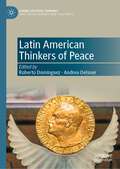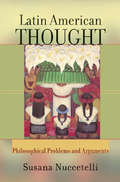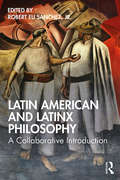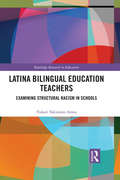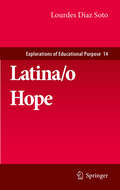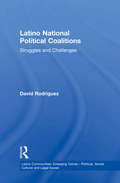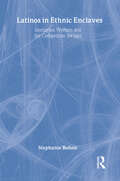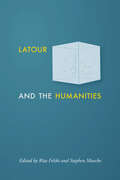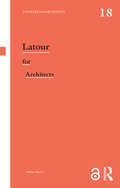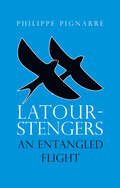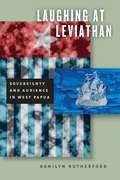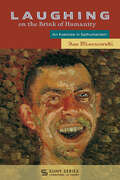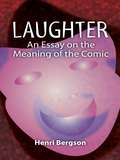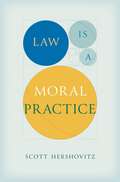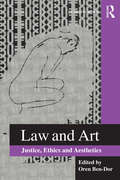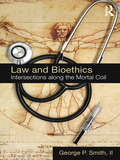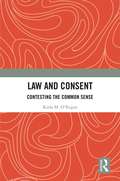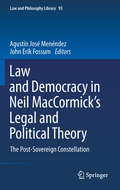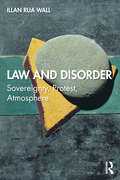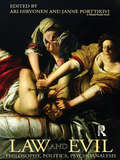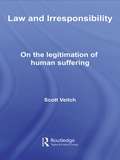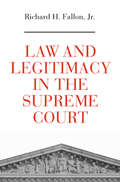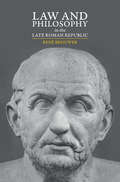- Table View
- List View
Latin American Thinkers of Peace (Global Political Thinkers)
by Andrea Oelsner Roberto DomínguezThis book analyzes seven Latin American thinkers who have contributed to building bridges for reconciliation and peace: Carlos Saavedra Lamas, Adolfo Pérez Esquivel, Alfonso García Robles, Óscar Arias Sánchez, Rigoberta Menchú Tum, Juan Manuel Santos, and Javier Pérez de Cuéllar. Working within an eclectic conceptual approach to systematize the circulation of ideas embraced by each one of the thinkers, the various contributions delve into the current literature of leadership and intellectuals in Politics and Global International Relations (GIR). Overall, the central premises of the analysis are based on three fundamentals of mainstream constructivism: a) change across time and space in the lifetime of each thinker under analysis in this book; b) socialization through changing norms, rules, and language; and c) processes of interaction in which actors make choices in selecting networks and strategies). Coming from different walks of life, the seven thinkers examined in this book have accessed the global public square and discussed ideas to reduce conflicts at different scales. In their respective historical times, they circulated their views and ideas beyond the confines of Latin America to influence global political thought and produce change in favor of peace.
Latin American Thought
by Susanna NuccetelliMany of the philosophical questions raised in Latin America may seem to be among the perennial problems that have concerned philosophers at different times and in different places throughout the Western tradition, but they are not altogether the same--for Latin American thinkers have often adapted them to capture problems presented by new circumstances, and sought resolutions with arguments that are indeed novel. This book explains how well-established philosophical traditions gave rise in the New World to a characteristic form of thought not to be found in other cultures. There was no clean sweep of the past and an attempt to start over: rather, Latin American thinkers gradually adapted European ideas to their needs, sometimes borrowing on a larger scale, sometimes less. It is then no surprise that, under Iberian rule, Scholasticism became the accepted view and began to lose its grip only when the rulers did. But what does seem surprising is the radical way in which those traditions were on occasions challenged, as illustrated by the cases of José de Acosta, a Jesuit priest in Peru, and the Mexican nun, Juana Inés de la Cruz-each of whom spoke out against certain aspects of the official philosophy in colonial society. And when theories familiar elsewhere arrived to Latin America, as in the cases of positivism and Marxism, they were often seen differently in the light of new circumstances.But above all, this book shows that there is a body of interesting philosophical arguments offered by Latin Americans concerning problems that have arisen in Spanish- and Portuguese-speaking parts of the New World. In connection with this purpose, it examines how Latin Americans have thought about philosophical issues belonging to metaphysics, philosophy of science, cross-cultural psychology, feminist epistemology, ethics, and social and political philosophy. These are taken up in due course, paying special attention to questions of rationality, gender discrimination, justice, human rights, reparation for historically dispossessed native peoples, and relativism vs. universalism--all matters of continuing concern in Latin American thought, from its earliest stirrings to the present day. And among some specific issues that have generated heated controversies from the early twentieth century to the present, the book explores how Latin Americans and their descendants abroad think of their own cultural identity, examines their critique of US mass-culture and moral philosophy, and considers at some length the vexing problem of which name, if any, is the correct one to use to refer to all of this exceedingly diverse ethnic group. A closer look at the defining elements of Latin American identity has often led to questions concerning the characteristic features that might distinguish Latin Americans and their descendants abroad from other peoples of the world, the existence of a typically Latin American philosophy, and the correct name to refer to them. These, often conflated in the literature, are treated separately by the author, who favors a historically-based account of Latin-American identity. She also argues that the existence of a characteristically Latin American philosophy can be shown-though not by appealing to some standard but implausible reasons. And to resolve the question concerning a correct ethnic-group name, she proposes a new approach to the semantics of those names.
Latin American Thought: Philosophical Problems and Arguments
by Susana NuccetelliMany of the philosophical questions raised in Latin America may seem to be among the perennial problems that have concerned philosophers at different times and in different places throughout the Western tradition, but they are not altogether the same--for Latin American thinkers have often adapted them to capture problems presented by new circumstances, and sought resolutions with arguments that are indeed novel. This book explains how well-established philosophical traditions gave rise in the New World to a characteristic form of thought not to be found in other cultures. There was no clean sweep of the past and an attempt to start over: rather, Latin American thinkers gradually adapted European ideas to their needs, sometimes borrowing on a larger scale, sometimes less. It is then no surprise that, under Iberian rule, Scholasticism became the accepted view and began to lose its grip only when the rulers did. But what does seem surprising is the radical way in which those traditions were on occasions challenged, as illustrated by the cases of José de Acosta, a Jesuit priest in Peru, and the Mexican nun, Juana Inés de la Cruz-each of whom spoke out against certain aspects of the official philosophy in colonial society. And when theories familiar elsewhere arrived to Latin America, as in the cases of positivism and Marxism, they were often seen differently in the light of new circumstances. But above all, this book shows that there is a body of interesting philosophical arguments offered by Latin Americans concerning problems that have arisen in Spanish- and Portuguese-speaking parts of the New World. In connection with this purpose, it examines how Latin Americans have thought about philosophical issues belonging to metaphysics, philosophy of science, cross-cultural psychology, feminist epistemology, ethics, and social and political philosophy. These are taken up in due course, paying special attention to questions of rationality, gender discrimination, justice, human rights, reparation for historically dispossessed native peoples, and relativism vs. universalism--all matters of continuing concern in Latin American thought, from its earliest stirrings to the present day. And among some specific issues that have generated heated controversies from the early twentieth century to the present, the book explores how Latin Americans and their descendants abroad think of their own cultural identity, examines their critique of US mass-culture and moral philosophy, and considers at some length the vexing problem of which name, if any, is the correct one to use to refer to all of this exceedingly diverse ethnic group. A closer look at the defining elements of Latin American identity has often led to questions concerning the characteristic features that might distinguish Latin Americans and their descendants abroad from other peoples of the world, the existence of a typically Latin American philosophy, and the correct name to refer to them. These, often conflated in the literature, are treated separately by the author, who favors a historically-based account of Latin-American identity. She also argues that the existence of a characteristically Latin American philosophy can be shown-though not by appealing to some standard but implausible reasons. And to resolve the question concerning a correct ethnic-group name, she proposes a new approach to the semantics of those names.
Latin American and Latinx Philosophy: A Collaborative Introduction
by Robert Eli Sanchez Jr.Latin American and Latinx Philosophy: A Collaborative Introduction is a beginner’s guide to canonical texts in Latin American and Latinx philosophy, providing the non-specialist with necessary historical and philosophical context, and demonstrating their contemporary relevance. It is written in jargon-free prose for students and professors who are interested in the subject, but who don’t know where to begin. Each of the twelve chapters, written by a leading scholar in the field, examines influential texts that are readily available in English and introduces the reader to a period, topic, movement, or school that taken together provide a broad overview of the history, nature, scope, and value of Latin American and Latinx philosophy. Although this volume is primarily intended for the reader without a background in the Latin American and Latinx tradition, specialists will also benefit from its many novelties, including an introduction to Aztec ethics; a critique of “the Latino threat” narrative; the legacy of Latin American philosophy in the Chicano movement; an overview of Mexican existentialism, Liberation philosophy, and Latin American and Latinx feminisms; a philosophical critique of indigenism; a study of Latinx contributions to the philosophy of immigration; and an examination of the intersection of race and gender in Latinx identity.
Latina Bilingual Education Teachers: Examining Structural Racism in Schools (Routledge Research in Education #22)
by Yukari Takimoto AmosUsing critical race theory and whiteness studies as theoretical frameworks, this book traces two Latina bilingual education teachers in three different professional phases: as paraprofessionals, teacher candidates, and certified teachers. Grounded in a longitudinal case study, this book sheds light on the effects of institutional racism when Latina/o educational professionals attempt inclusion in white dominant organizations, such as schools. Revealing and analyzing the structural racism present in schools and the obstacles it creates for professionals of color, the author exposes the racist practices that are hidden from view and offer practical solutions to combat them.
Latina/o Hope
by Lourdes Diaz SotoThere are an estimated forty-eight million Latinas/os living in the United States, roughly sixteen percent of the population. Not only are they the largest minority group in the country but also the youngest: one out of five children is Latina/o. The rise in the Latina/o population has caused for panic in some areas of the country, resulting in hostile and sometimes violent racism and xenophobia, and yet, much of that hatred is fueled not on facts but rather on myths about immigration. To date, most studies on immigration have been data driven, focusing on migrating groups or policy analyses. Latina/o Hope is different. It incorporates salient theories on migration as it moves toward a new theorizing, one that views immigration from the immigrant's perspective. Thus, it integrates research into the depiction of various slices of immigrant experience--the young women disappearing in the city of Juarez, the various students at various stages of their educational journeys, the young children in need of ESL programs, the ethnically-mixed immigrants, the undocumented workers, and others. Latina/o Hope discusses the impact of neoliberal policies and global capitalization on the daily lives of Latina/o immigrants, serving as an inspiration for dialogue, praxis and imagination to love and serve one another.
Latino National Political Coalitions: Struggles and Challenges (Latino Communities: Emerging Voices - Political, Social, Cultural and Legal Issues)
by David RodriguezThis study examines Latino national political coalitions in the United States with a focus on Chicanos, Puerto Ricans, and Cubans. It argues that Latino national political coalitions are an avenue of political empowerment for the Latino Community, but face social, economic, and political challenges in the Latino community.
Latinos in Ethnic Enclaves: Immigrant Workers and the Competition for Jobs (Latino Communities: Emerging Voices - Political, Social, Cultural and Legal Issues)
by Stephanie BohonThis work explores the competition for jobs between different Latin American immigrant groups in the U.S. economy. Bohon's research looks at occupational status attainment among Latino groups in Miami and three other U.S. cities with flourishing Latino enclaves.
Latour and the Humanities
by Rita Felski and Stephen MueckeHow does the work of influential theorist Bruno Latour offer a fresh angle on the practices and purposes of the humanities?In recent years, defenses of the humanities have tended to argue along predictable lines: the humanities foster empathy, the humanities encourage critical thinking, the humanities offer a counterweight to the cold calculations of the natural and social sciences. The essays in Latour and the Humanities take a different approach. Exploring the relevance of theorist Bruno Latour's work, they argue for attachments and entanglements between the humanities and the sciences while looking closely at the interests, institutions, and intellectual projects that shape the humanities within and beyond the university. The collection, which is written by a group of highly distinguished scholars from around the world, is divided into two sections. In the first part, authors engage in depth with Latour's work while also rethinking the ties between the humanities and the sciences. Essays argue for greater attention to the nonhuman world, the urgency of climate change, and more nuanced views of universities as institutions. The second half of the volume contains essays that reflect on Latour's influence on the practices of specific disciplines, including art, the digital humanities, film studies, and political theory.Inspiring conversation about the relevance of actor-network-theory for research and teaching in the humanities, Latour and the Humanities offers a substantial introduction to Latour's work while discussing the humanities without falling back on the genres of either the sermon or the jeremiad. This volume will be of interest to all those searching for fresh perspectives on the value and importance of humanistic disciplines and thought.Contributors: David J. Alworth, Anders Blok, Claudia Breger, Dipesh Chakrabarty, Yves Citton, Steven Connor, Gerard de Vries, Simon During, Rita Felski, Francis Halsall, Graham Harman, Antoine Hennion, Casper Bruun Jensen, Bruno Latour, Heather Love, Patrice Maniglier, Stephen Muecke, Barbara Herrnstein Smith, Nigel Thrift, Michael Witmore
Latour for Architects (Thinkers for Architects)
by Albena YanevaBruno Latour is one of the leading figures in Social Sciences today, but his contributions are also widely recognised in the arts. His theories ‘flourished’ in the 1980s in the aftermath of the structuralism wave and generated new concepts and methodologies for the understanding of the social. In the past decade, Latour and his Actor-Network Theory (ANT) have gained popularity among researchers in the field of architecture. Latour for Architects is the first introduction to the key concepts and ideas of Bruno Latour that are relevant to architects. First, the book discusses critically how specific methods and insights from his philosophy can inspire new thinking in architecture and design pedagogy. Second, it explores examples from architectural practice and urban design, and reviews recent attempts to extend the methods of ANT into the fields of architectural and urban studies. Third, the book advocates an ANT-inspired approach to architecture, and examines how its methodological insights can trace new research avenues in the field, reflecting meticulously on its epistemological offerings. Drawing on many lively examples from the world of architectural practice, the book makes a compelling argument about the agency of architectural design and the role architects can play in re-ordering the world we live in. Following Latour’s philosophy offers a new way to handle all the objects of human and nonhuman collective life, to re-examine the role of matter in design practice, and to redefine the forms of social, political and ethical associations that bind us together in cities.
Latour-Stengers: An Entangled Flight
by Philippe PignarreCertain great friendships have left their mark in the annals of philosophy – and, without a doubt, the friendship of Bruno Latour and Isabelle Stengers is among them. Although they wrote very few texts together, their intellectual companionship lasted for over thirty years, and their respective work can be fully understood only when the many interconnections of their thought are brought to the fore. Latour and Stengers occupy the same starting place, one which remains at the heart of their work: scientific practice, which is the pride of modernity. Why do we Moderns define ourselves as those who know, while others are condemned to be only believers? This question led Latour and Stengers to the same fundamental question: how to understand and live in what Latour calls “the new climatic regime” and what Stengers calls “catastrophic times”? Philippe Pignarre’s aim is not to try to sort out which ideas belong to whom but rather to interweave their thought even more. In so doing, he sheds new light on the origins and development of their work at the same time as he documents an exceptional intellectual adventure between two of the leading thinkers of our age.
Laughing at Leviathan: Sovereignty and Audience in West Papua
by Danilyn RutherfordFor West Papua and its people, the promise of sovereignty has never been realized, despite a long and fraught struggle for independence from Indonesia. In Laughing at Leviathan, Danilyn Rutherford examines this struggle through a series of interlocking essays that drive at the core meaning of sovereignty itself--how it is fueled, formed, and even thwarted by pivotal but often overlooked players: those that make up an audience. Whether these players are citizens, missionaries, competing governmental powers, nongovernmental organizations, or the international community at large, Rutherford shows how a complex interplay of various observers is key to the establishment and understanding of the sovereign nation-state. Drawing on a wide array of sources, from YouTube videos to Dutch propaganda to her own fieldwork observations, Rutherford draws the history of Indonesia, empire, and postcolonial nation-building into a powerful examination of performance and power. Ultimately she revises Thomas Hobbes, painting a picture of the Leviathan not as a coherent body but a fragmented one distributed across a wide range of both real and imagined spectators. In doing so, she offers an important new approach to the understanding of political struggle.
Laughing on the Brink of Humanity: An Exercise in Epihumanism (SUNY series, Literature . . . in Theory)
by Jan MiernowskiWhat does it mean to be human? And, more precisely, what does it mean to be human now, with both humanism and the humanities in crisis? In answer to these questions, Laughing on the Brink of Humanity seeks not some essence of the human but rather an epiphenomenal manifestation—a sign of the human. The book finds such a sign in the joyless, painful, and often deadly laughter that resonates when we cross the barrier between what is human and what is not: animality, machinery, divinity. Jan Miernowski brings together a wide swath of discourses and figures, from Plato and the Bible through early modern humanism, to Friedrich Nietzsche, Georges Bataille, Hannah Arendt, Claude Lanzmann, Spike Jonze, Tom Stoppard, and Michel Houellebecq. Looking for laughter on the brink of humanity—in literature and philosophy, natural science and film, theology and computer science—the book offers an exercise in epihumanism appropriate to our posthuman age.
Laughter: An Essay on the Meaning of the Comic
by Henri Bergson Cloudesley Brereton Fred RothwellIn this great philosophical essay, Henri Bergson explores why people laugh and what laughter means. Written at the turn of the twentieth century, Laughter explores what it is in language that makes a joke funny and what it is in us that makes us laugh.One of the functions of humor, according to Bergson, is to help us retain our humanity during an age of mechanization. Like other philosophers, novelists, poets, and humorists of his era, Bergson was concerned with the duality of man and machine. His belief in life as a vital impulse, indefinable by reason alone, informs his perception of comedy as the relief we experience upon distancing ourselves from the mechanistic and materialistic. "A situation is always comic," Bergson notes, "if it participates simultaneously in two series of events which are absolutely independent of each other, and if it can be interpreted in two quite different meanings." The philosopher's thought-provoking insights (e.g., "It seems that laughter needs an echo. Our laughter is always the laughter of a group.") keep this work ever-relevant as a thesis on the principles of humor.
Law Is a Moral Practice
by Scott HershovitzA powerful argument for the essential role of morality in law, getting at the heart of key debates in public life.What is law? And how does it relate to morality? It’s common to think that law and morality are different ways of regulating our lives. But Scott Hershovitz says that this is a mistake: law is a part of our moral lives. It’s a tool we use to adjust our moral relationships. The legal claims we advance in court, Hershovitz argues, are moral claims. And our legal conflicts are moral conflicts.Law Is a Moral Practice supplies fresh answers to fundamental questions about the nature of law and helps us better appreciate why we disagree about law so deeply. Reviving a neglected tradition of legal thought most famously associated with Ronald Dworkin, Hershovitz engages with important legal and political controversies of our time, including recent debates about constitutional interpretation and the obligations of citizens and officials to obey the law.Leavened by entertaining personal stories, guided by curiosity rather than ideology, moving beyond entrenched dichotomies like the opposition between positivism and natural law, Law Is a Moral Practice is a thought-provoking investigation of the philosophical issues behind real-world legal debates.
Law and Art: Justice, Ethics and Aesthetics
by Oren Ben-DorIn engaging with the full range of 'the arts', contributors to this volume consider the relationship between law, justice, the ethical and the aesthetic. Art continually informs the ethics of a legal theory concerned to address how theoretical abstractions and concrete oppressions overlook singularity and spontaneity. Indeed, the exercise of the legal role and the scholarly understanding of legal texts were classically defined as ars iuris - an art of law - which drew on the panoply of humanist disciplines, from philology to fine art. That tradition has fallen by the wayside, particularly in the wake of modernism. But approaching art in that way risks distorting the very inexpressibility to which art is attentive and responsive, whilst remaining a custodian of its mystery. The novelty and ambition of this book, then, is to elicit, in very different ways, styles and orientations, the importance of the relationship between law and art. What can law and art bring to one another, and what can their relationship tell us about how truth relates to power? The insights presented in this collection disturb and supplement conventional accounts of justice; inaugurating new possibilities for addressing the origin of violence in our world.
Law and Authority in British Legal History, 1200–1900
by Mark GodfreyBy presenting original research into British legal history, this volume emphasises the historical shaping of the law by ideas of authority. The essays offer perspectives upon the way that ideas of authority underpinned the conceptualisation and interpretation of legal sources over time and became embedded in legal institutions. The contributors explore the basis of the authority of particular sources of law, such as legislation or court judgments, and highlight how this was affected by shifting ideas relating to concepts of sovereignty, religion, political legitimacy, the nature of law, equity and judicial interpretation. The analysis also encompasses ideas of authority which influenced the development of courts, remedies and jurisdictions, international aspects of legal authority when questions of foreign law or jurisdiction arose in British courts, the wider authority of systems of legal ideas such as natural law, the authority of legal treatises, and the relationship between history, law and legal thought.
Law and Bioethics: Intersections Along the Mortal Coil
by George P. Smith IIGeorge P. Smith, II is a leading figure in the world of medical law and ethics. During his long career he has addressed some of the most important issues in bioethics and has contributed much original thought to debates in the field. This book celebrates his contribution to scholarship in this area and brings together his key writings in bioethics. The chapters include previously published material which has been substantially updated to reflect recent developments in medicine and law. The book covers topics such as: human rights and medical law; the allocation of resources and distributive justice; ethical relativism; science and religion; and public health emergencies. Taken as a whole, this book examines the extent to which law, medicine, economics, and bioethics interact as synergistic vectors of force in shaping and setting both personal and public responses to the complexities of biotechnology, or what has been referred to as "The New Biology." All too often, past considerations of this topic have neglected to recognise the synergistic influences of law as a catalyst for codifying contemporary values into normative standards. Professor Smith reaches the conclusion that if traditional bioethical principles are to be seen as pertinent constructs for policy making, they must be broadened through the law of public health and Human rights. Law and Bioethics: Intersections along the Mortal Coil casts law as the pivotal force in bringing stability to the ongoing debates on how to maintain bioethical relevance in decision making and in so doing, it offers an excellent overview of the current bioethical issues in medical law considered in light of recent and ongoing technological developments in medicine. This book will be of particular interest to academics and students of Law, Political Science, Philosophy and Economics.
Law and Consent: Contesting the Common Sense
by Karla M. O'ReganConsent is used in many different social and legal contexts with the pervasive understanding that it is, and has always been, about autonomy – but has it? Beginning with an overview of consent’s role in law today, this book investigates the doctrine’s inseparable association with personal autonomy and its effect in producing both idealised and demonised forms of personhood and agency. This prompts a search for alternative understandings of consent. Through an exploration of sexual offences in Antiquity, medical practice in the Middle Ages, and the regulation of bodily harm on the present-day sports field, this book demonstrates that, in contrast to its common sense story of autonomy, consent more often operates as an act of submission than as a form of personal freedom or agency. The book explores the implications of this counter-narrative for the law’s contemporary uses of consent, arguing that the kind of freedom consent is meant to enact might be foreclosed by the very frame in which we think about autonomy itself. This book will be of interest to scholars of many aspects of law, history, and feminism as well as students of criminal law, bioethics, and political theory.
Law and Democracy in Neil MacCormick's Legal and Political Theory: The Post-Sovereign Constellation
by John Erik Fossum Agustín José MenéndezThis volume offers a collection of articles by leading legal and political theorists. Originally intended as a celebration of MacCormick's work on the occasion of the completion of the four-volume series on Law, State and Practical Reason, it has turned into a homage and salute after MacCormick's passing. Cast in MacCormick's reflexive spirit, the book presents a critical reconstruction of the Scottish philosopher's work, with the aim of revealing the connections between law and democracy in his writings and furthering his insights in each specific field. Neil MacCormick made outstanding contributions to the understanding of law and democracy under conditions of pluralism. His institutional theory of law has elucidated the close connection between the normative character of law as a means of social integration and legal social practices. This has produced a synthesis of the key insights of the legal and political theories of Kelsen, Hart, Alexy and Dworkin, and has broken new ground by undermining the 'monolithic' and 'nation-state' centered character of standard legal theories.
Law and Disorder: Sovereignty, Protest, Atmosphere
by Illan rua WallFocusing on the moment when social unrest takes hold of a populace, Law and Disorder offers a new account of sovereignty with an affective theory of public order and protest. In a state of unrest, the affective architecture of the sovereign order begins to crumble. The everyday peace and calm of public space is shattered as sovereign peace is challenged. In response, the state unleashes the full force of its exceptionality, and the violence of public order policing is deployed to restore the affects and atmospheres of habitual social relations. This book is a work of contemporary critical legal theory. It develops an affective theory of sovereign orders by focusing on the government of affective life and popular encounters with sovereignty. The chapters explore public order as a key articulation between sovereignty and government. In particular, policing of public order is exposed as a contemporary mode of exceptionality cast in the fires of colonial subjection. The state of unrest helps us see the ordinary affects of the sovereign order, but it also points to crowds as the essential component in the production of unrest. The atmospheres produced by crowds seep out from the squares and parks of occupation, settling on cities and states. In these new atmospheres, new possibilities of political and social organisation begin to appear. In short, crowds create the affective condition in which the settlement at the heart of the sovereign order can be revisited. This text thus develops a theory of sovereignty which places protest at its heart, and a theory of protest which starts from the affective valence of crowds. This book’s examination of the relationship between sovereignty and protest is of considerable interest to readers in law, politics and cultural studies, as well as to more general readers interested in contemporary forms of political resistance.
Law and Evil: Philosophy, Politics, Psychoanalysis
by Ari Hirvonen Janne PorttikiviLaw and Evil opens, expands and deepens our understanding of the phenomenon of evil by addressing the theoretical relationship between this phenomenon and law. Hannah Arendt said 'the problem of evil will be the fundamental question of post-war intellectual life in Europe'. This statement is, unfortunately, more than valid in the contemporary world: not only in the events of war, crimes against humanity, terror, repression, criminality, violence, torture, human trafficking, and so on; but also as evil is used rhetorically to condemn these acts, to categorise their perpetrators, and to justify forcible measures, both in international and domestic politics and law. But what is evil? Evil as a concept is too often taken as something that is self-evident, something that is always already defined. Taking Kant’s concept of radical evil as a starting point, this volume counters such a tendency. Bringing together philosophical, political, and psychoanalytical perspectives, in analysing both the concept and the phenomenon of evil, the contributors to this volume offer a rich and thoroughgoing analysis of the multifaceted phenomenon of evil and its relationship to law.
Law and Irresponsibility: On the Legitimation of Human Suffering
by Scott VeitchLaw is widely assumed to provide contemporary society with its most important means of organizing responsibility. Across a broad range of areas of social life – from the activities of states and citizens, to work, business and private relationships – it is understood that legal regulation plays a crucial role in defining and limiting responsibilities. But Law and Irresponsibility pursues the opposite view: it explores how law organizes irresponsibility. With a particular focus on large-scale harms – including extensive human rights violations, forms of colonialism, and environmental or nuclear devastation – this book analyzes the ways in which law legitimates human suffering by demonstrating how legal institutions operate as much to deflect responsibility for harms suffered as to acknowledge them. Drawing on a series of case studies, it shows not only how law facilitates the dispersal and disavowal of responsibility, but how it does so in consistent and patterned ways. Irresponsibility is organized, and its organization is traced here to the legal forms, and the social and political conditions, that sustain ‘our’ complicity in human suffering. This innovative and interdisciplinary book provides a radical challenge to conventional thinking about law and legal institutions. It will be of considerable interest to those working in law, political and legal theory, sociology and moral philosophy.
Law and Legitimacy in the Supreme Court
by Richard H. Fallon Jr.Richard Fallon offers theories of constitutional law and judicial legitimacy that accept many tenets of legal realism but reject its corrosive cynicism. Based on an ideal of good faith, his account both illuminates current practice and prescribes urgently needed responses to a legitimacy crisis in which the Supreme Court is increasingly enmeshed.
Law and Philosophy in the Late Roman Republic
by René BrouwerThe middle of the second until the middle of the first century BCE is one of the most creative periods in the history of human thought, and an important part of this was the interaction between Roman jurists and Hellenistic philosophers. In this highly original book, René Brouwer shows how jurists transformed the study of law into a science with the help of philosophical methods and concepts, such as division, rules and persons, and also how philosophers came to share the jurists' preoccupations with cases and private property. The relevance of this cross-fertilization for present-day law and philosophy cannot be overestimated: in law, its legacy includes the academic study of law and the Western models of dispute resolution, while in philosophy, the method of casuistry and the concept of just property.
